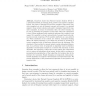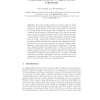ICFCA
2007
Springer
13 years 8 months ago
2007
Springer
Recent advances in data and knowledge engineering have emphasized the need for formal concept analysis (FCA) tools taking into account structured data. There are a few adaptations ...
ICFCA
2007
Springer
13 years 8 months ago
2007
Springer
Several fuzzifications of formal concept analysis have been proposed to deal with uncertainty or incomplete information. In this paper, we focus on the new paradigm of multi-adjoin...
ICFCA
2007
Springer
13 years 8 months ago
2007
Springer
Abstract. The Galois Sub-hierarchy (GSH) is a polynomial-size representation of a concept lattice which has been applied to several fields, such as software engineering and linguis...
ICFCA
2007
Springer
13 years 8 months ago
2007
Springer
Different rule semantics have been successively defined in many contexts such as implications in artificial intelligence, functional dependencies in databases or association rules...
ICFCA
2007
Springer
13 years 10 months ago
2007
Springer
ICFCA
2007
Springer
13 years 10 months ago
2007
Springer
Kuznetsov shows that Formal Concept Analysis (FCA) is a natural framework for learning from positive and negative examples. Indeed, the results of learning from positive examples (...
ICFCA
2007
Springer
13 years 10 months ago
2007
Springer
Pseudo-intents (also called pseudo-closed sets) of formal contexts have gained interest in recent years, since this notion is helpful for finding minimal representations of impli...
ICFCA
2007
Springer
13 years 10 months ago
2007
Springer
We model a Digital Library as a formal context in which objects are documents and attributes are terms describing documents contents. A formal concept is very close to the notion o...


